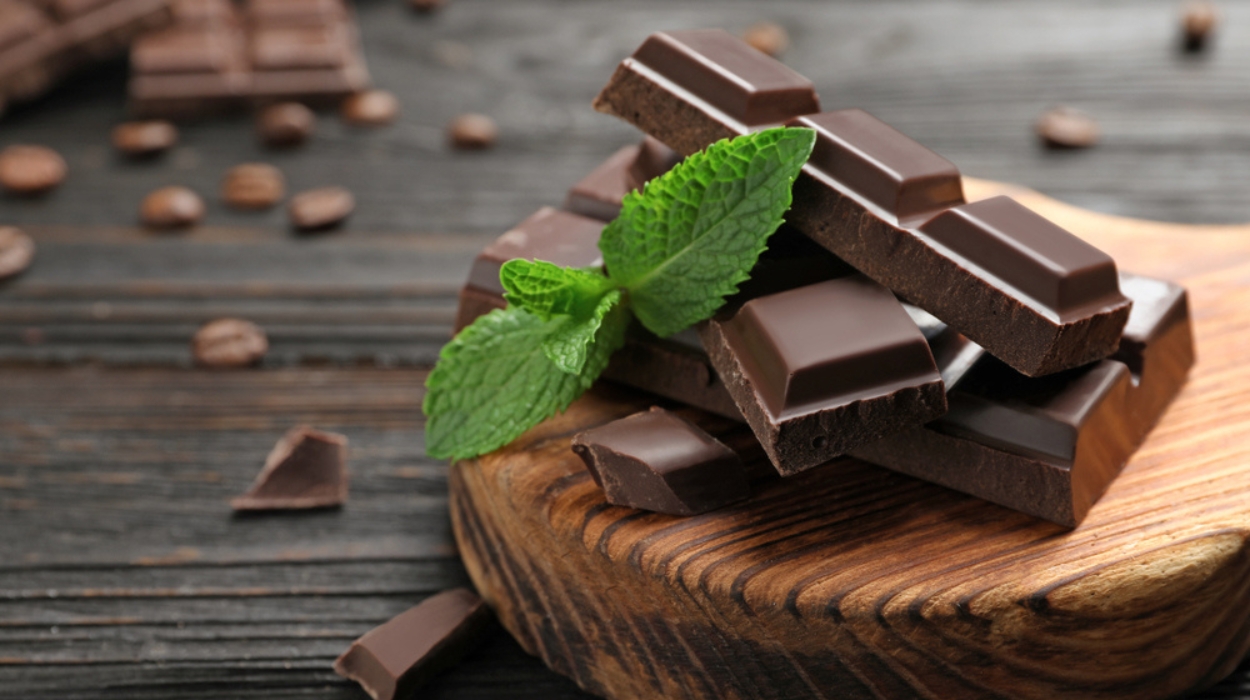Starting a weight loss journey often involves thinking carefully about your food choices, with one unexpected contender being dark chocolate.
While the idea of a sweet treat supporting weight loss may seem counterintuitive, research suggests that there may be a relationship between people consuming dark chocolate and weight loss.
This article will examine the question: is dark chocolate good for weight loss?
Beyond its indulgent taste, we will take a look at dark chocolate’s nutritional profile and the health benefits it offers. We will also look at how the healthy fats in dark chocolate can potentially support weight loss and which type is best for weight loss.
We’ll give you some healthy ideas as to how you can easily incorporate dark chocolate into your diet. So, are you ready to find out more about dark chocolate and weight loss? Let’s get into it!
Is Dark Chocolate Good For Losing Weight?
Yes, dark chocolate can be part of a weight loss diet if eaten in moderation. Studies suggest it has a satiating effect, supports insulin sensitivity, and is better for heart health compared to white or milk chocolate. It also contains monounsaturated fats, which have been linked to heart health and weight loss.
But not all dark chocolate is equal; you should opt for those with higher percentages of cocoa solids and less sugar. When eaten in moderation and incorporated into a balanced diet, dark chocolate can be a great food for weight loss.
Is Dark Chocolate Good For Weight Loss?

When assessing your diet to lose weight, you may have never considered dark chocolate a good food for a weight-loss diet. Surprisingly though, dark chocolate may actually be good for losing weight.
Boost Satiety
Eating dark chocolate has been linked with a satiating effect, potentially curbing those between-meal cravings. One study[1] comparing postmenopausal women eating dark chocolate to white and milk chocolate consumption found that the women consuming dark chocolate ate significantly fewer calories later in the day. Dark chocolate contains monounsaturated fats, which foster a sense of fullness,[2] reducing the chance of weight gain.
While the caloric content of dark chocolate should be considered, in small doses, it may provide a satiating effect that could support weight loss.
Regulate Blood Sugar
Scientific research also suggests[3] that dark chocolate may reduce insulin resistance,[4] increase insulin sensitivity and lower blood pressure. It has also been linked to successful weight management[5] and a healthier profile of fats[6] in the blood.
Improve Brain Health
Dark chocolate also has potential benefits for brain health. Rich in flavonoids and cocoa polyphenols, dark chocolate may enhance blood flow to the brain, supporting cognitive function. One study found that those who consumed dark chocolate experienced elevated mood[7] and memory after eating.
Supplement Antioxidants
Dark chocolate, with a higher cocoa content than white or milk chocolate, contains a high amount of antioxidants. These antioxidants, particularly flavonoids, are known for their health benefits, including being beneficial for cardiovascular health[5] and blood pressure.
While dark chocolate offers many health benefits, it’s important to be mindful of potential downsides. Dark chocolate is calorie-dense and high in fat, which can contribute to weight gain if consumed in excess.
Excessive intake of dark chocolate can also lead to a large sugar intake, which could increase the risk of cavities. Some people may also be sensitive to the caffeine content in dark chocolate and potentially experience side effects like insomnia. Typically, the higher the percentage of cocoa solids, the more caffeine the chocolate will contain.
The Nutritional Value Of Dark Chocolate
If you’re considering adding dark chocolate to your weight loss diet, it’s important to know about its nutritional value.
Per serving, which is about 28 grams, dark chocolate[8] contains:
- Calories: 170 calories.
- Carbohydrates: 13 grams.
- Sugar: 6.8 grams.
- Protein: 2.2 grams.
- Fat: 12 grams.
- Iron: 3.4 milligrams.
- Magnesium: 65 milligrams.
Dark chocolate has a relatively low amount of carbohydrates, making it a great food if you’re trying to reduce your carb intake. Its sugar content is much lower than both milk[9] and white[10] chocolate, which contain 14.4 and 16.5 grams of sugar per serving, respectively.
Dark chocolate contains abundant essential vitamins and minerals, including iron and magnesium. Magnesium benefits various bodily functions, including cardiovascular well-being and muscle function. Iron is essential for energy levels and also supports athletic performance.
Whilst dark chocolate is relatively high in fat, it contains monounsaturated fatty acids, which have been linked to several health benefits. Monounsaturated fats have been linked to improved heart health[11] and blood sugar control.[12] Also, research has found that consuming foods with monounsaturated fats has been linked to weight loss.[2]
Despite its various health benefits, moderation is key due to dark chocolate’s high calorie and fat content.
How Dark Chocolate Compares To Other Chocolate
Dark chocolate is very distinct from milk and white chocolate in several key aspects.
The most obvious difference is its cocoa content. Dark chocolate boasts a much higher percentage of cocoa solids, often ranging from 50% to 90%, while milk and white chocolate contain considerably less. This leads to a richer, more intense flavor in dark chocolate.
Sugar content also varies massively between these varieties. Dark chocolate usually has much less sugar compared to other types. This makes it a great option for those looking to avoid added sugar.
Regarding additives, dark chocolate often contains minimal ingredients, letting the strong cocoa flavor shine. Milk and white chocolate often contain additional ingredients, such as milk solids and sugars, altering both their taste and nutritional profiles.
Dark chocolate’s higher cocoa content delivers more antioxidants and potential health benefits. This makes it a better option for those looking for a sweet treat that also supports their health and well-being.
If you’re sensitive to caffeine, it’s worth noting that dark chocolate has a higher amount compared to white and milk chocolate as it contains a higher percentage of cocoa solids.
Which Dark Chocolate Is Good For Weight Loss?

Not all dark chocolates are equal, and some types are healthier than others. Here are some tips on choosing the right dark chocolate to aid weight loss.
Cocoa Solids
Prioritize high-quality dark chocolate with higher percentages of cocoa solids. This is because more cocoa solids mean a richer concentration of antioxidants, which impart more health benefits.
Another great advantage of choosing dark chocolate with higher cocoa solid percentages is the correlated reduction in sugar content. Generally, as the percentage of cocoa solids increases, all other ingredients, including added sugars, will decrease. This enhances the chocolate’s health benefits while being more suitable for a weight loss diet.
Flavorings
When choosing dark chocolate for a weight loss diet, steer clear of varieties with additional flavorings, such as caramel. These additives not only compromise the purity of dark chocolate but also introduce unnecessary calories and sugars. This influx could potentially counteract your weight loss efforts by contributing towards a higher calorie and sugar intake.
Opting for plain, high-quality dark chocolate with minimal added ingredients ensures a more controlled and healthy intake.
Milk
High-quality dark chocolate typically doesn’t contain any milk-containing ingredients. However, some manufacturers sometimes add milk fat to impart a softening effect and enhance the flavor of the dark chocolate. It’s important to note that this isn’t required when making good-quality dark chocolate.
Trans Fat
If you come across dark chocolate that contains trans fat, steer clear. Trans fat consumption poses a considerable risk for heart disease.[13]
As of January 1, 2021, manufacturers could no longer add trans fats[14] to foods as partially hydrogenated oils or fats. However, to ensure your chocolate is trans-fat-free, read the nutrition label carefully before purchasing.
If you are looking for more support with losing weight, there are multiple supplements and fat burners on the market that can help you lose weight.
How To Eat Dark Chocolate For Weight Loss?
Moderation is key when eating dark chocolate for weight loss. Here are some tips on how to eat dark chocolate effectively and healthily.
Opt for dark chocolate with a higher cocoa content, preferably 70% or more, as it often contains lower sugar levels. While rich in antioxidants and potential health benefits, dark chocolate is relatively high in calories and fat, so moderation is key.
Consider incorporating dark chocolate as a satisfying treat as part of a well-balanced diet. Be conscious of portion sizes, savoring its richness in small amounts to keep calorie intake in check. Choosing these moments of indulgence wisely, such as after a nutritious meal, can enhance overall enjoyment without compromising weight loss.
To make informed choices, make sure to inspect the ingredient list before purchasing to ensure you are avoiding trans fat and high sugar levels. Mindful chocolate consumption, coupled with an active lifestyle, can optimize the benefits of dark chocolate without compromising weight loss.
Ways To Eat Dark Chocolate
If you’re looking for a healthy late night snack or something to keep you satisfied between meals, look no further! Here are some healthy dark chocolate recipe ideas:
- Dark chocolate-dipped strawberries: Dip fresh strawberries into high cocoa, melted dark chocolate for a healthy, sweet treat.
- Nutty dark chocolate bark: Mix chopped nuts into melted dark chocolate, spread on a tray, chill, and break into pieces for a satisfying snack.
- Dark chocolate smoothie bowl: Blend frozen berries, banana, Greek yogurt, and a square of dark chocolate. Top with nuts and seeds for a nutrient-packed breakfast or dessert.
- Dark chocolate energy bites: Combine oats, almond butter, honey, and dark chocolate chunks. Roll into bite-sized balls for a quick, energy-boosting snack.
- Dark chocolate avocado mousse: Blend ripe avocado, cocoa powder, a touch of honey, and melted dark chocolate for a creamy, indulgent mousse.
- Healthy hot chocolate: Mix milk, cocoa powder, maple syrup, and two to three squares of dark chocolate and heat until warm and all ingredients are melted together.
Conclusion
Dark chocolate has several potential health benefits, including weight loss. Dark chocolate’s satiating effect offers a good option if you’re looking to curb between-meal cravings. Scientific research suggests links between dark chocolate and insulin resistance, successful weight management, and healthier blood fats.
Its nutritional value reveals a host of antioxidants, notably flavonoids, which benefit cardiovascular health. While dark chocolate is relatively high in fat, its monounsaturated fat has associated health benefits, such as improved heart health and blood sugar control.
Choosing the right dark chocolate for weight loss involves considering factors like cocoa solids, avoiding flavorings, and being cautious about sugar content. Moderation is key due to its high caloric and fat content, but dark chocolate can be a great addition to a healthy diet when consumed mindfully.
Frequently Asked Questions
Dark chocolate alone doesn’t burn belly fat. While it may offer several health benefits, moderation is crucial. For effective weight loss, focus on a balanced diet and regular exercise.
Enjoy a small portion of dark chocolate, around 28 to 43 grams, as a tasty treat within your calorie limits. Moderation is key for effective weight loss while relishing the benefits of dark chocolate.
Yes, it’s okay to eat dark chocolate daily in moderation. Stick to small portions, preferably with a higher cocoa content. Consider your overall diet, specifically caloric needs, and lifestyle when eating dark chocolate.
Calories in dark chocolate vary, but a small piece (around 14 grams) typically contains 75-85 calories.
 Expert's opinion
Expert's opinion